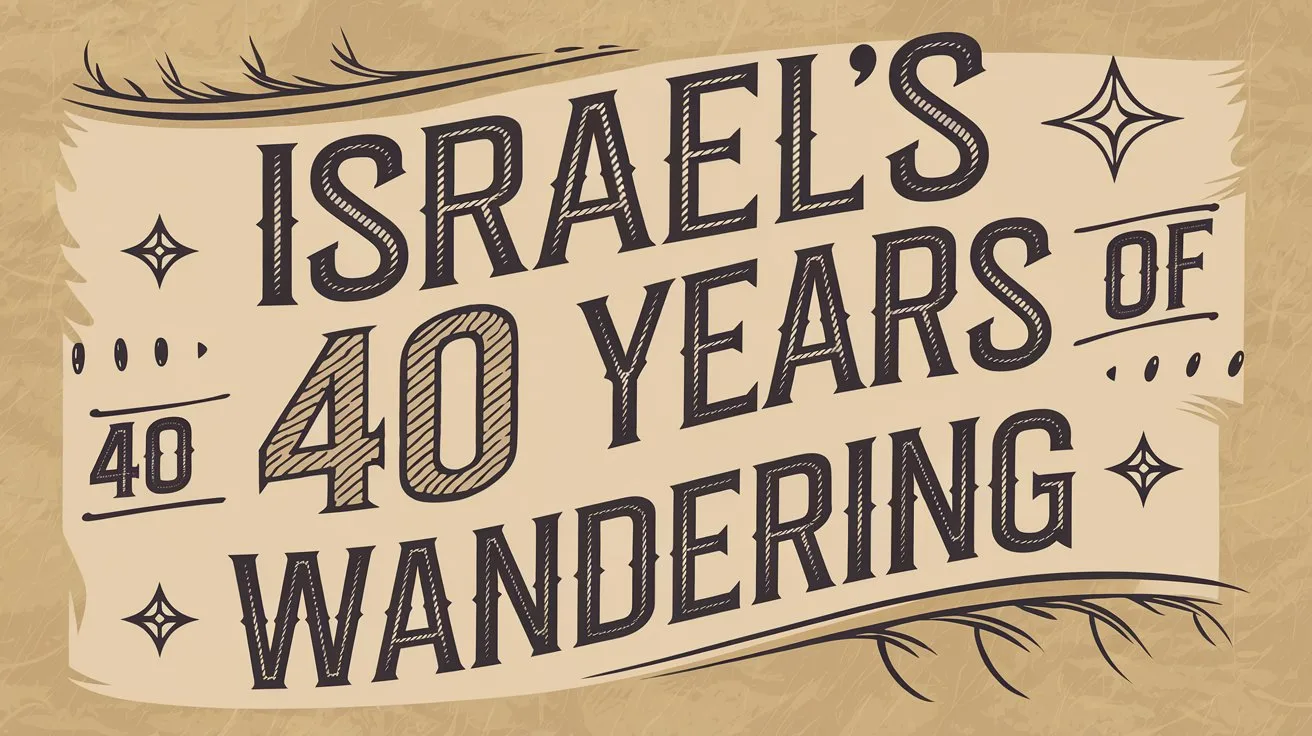After being miraculously delivered from slavery in Egypt, the Israelites stood at the threshold of the Promised Land, only to turn away in fear. That decision led them into 40 years of wandering in the wilderness, not because God had abandoned them, but because they refused to trust Him.
What should have been a short journey became a lifelong lesson. They had seen God’s power, yet their hearts were hardened. They had been freed from Pharaoh’s grip, yet they longed for Egypt. They had been given the promise, yet they hesitated. This study will walk through why they wandered, what God was teaching them, and how this applies to us today.
Why Did Israel Wander for 40 Years?
The turning point came in Numbers 13-14. God had brought them to the border of Canaan, the land He swore to give them. He instructed Moses to send twelve spies to scout the land. When they returned, their report was divided.
Ten spies focused on the dangers:
“The land devours its inhabitants… we were like grasshoppers in our own sight” (Numbers 13:32-33).Only Joshua and Caleb spoke in faith:
“Let us go up at once and take possession, for we are well able to overcome it!” (Numbers 13:30).
Instead of trusting in God’s power, the people gave in to fear and unbelief. They wept all night, accused God of bringing them there to die, and even talked about going back to Egypt (Numbers 14:1-4).
This moment defined their fate. They had seen God split the Red Sea, rain down manna, and lead them with fire and cloud. Yet they still doubted. Their lack of faith cost them everything. God declared,
“For every day you spied out the land, you will wander a year: forty years in the wilderness until this generation is gone” (Numbers 14:34).
Only Joshua and Caleb, the two who trusted God, would enter the land. Everyone else (except the children who had not yet reached the age of accountability) would die in the desert.
What Was God Teaching Them in the Wilderness?
The wilderness wasn’t just a punishment; it was a season of testing and refinement. God was teaching them dependence, obedience, and trust.
They had no farmland, no stored food, and no certainty of tomorrow’s provisions. But God never left them.
- He fed them with manna from heaven (Exodus 16:35).
- He provided water from a rock (Exodus 17:6).
- Their clothes and sandals never wore out (Deuteronomy 29:5).
- He led them daily with a pillar of cloud by day and fire by night (Exodus 13:21-22).
Moses later explained in Deuteronomy 8:2-3:
“The Lord your God led you these forty years in the wilderness, to humble you and test you, to know what was in your heart… that He might make you know that man shall not live by bread alone, but by every word that proceeds from the mouth of the Lord.”
This was a lesson in trust. They were to learn that God is the provider and that obedience leads to blessing, while rebellion leads to consequences.
Their Continued Rebellion
Even after experiencing God’s provision, the Israelites continued to test Him. In Numbers 16, a Levite named Korah led a rebellion against Moses and Aaron, claiming they had no right to lead. God responded with an earthquake that swallowed Korah and his followers alive.
In Numbers 21, after another round of complaining, God sent venomous serpents among the people. When they repented, He told Moses to make a bronze serpent (whoever looked upon it would be healed). Jesus later used this event to point to His own crucifixion (John 3:14-15).
Even Moses himself failed. In Numbers 20, the people demanded water again. God told Moses to speak to a rock, but in frustration, he struck the rock twice instead. Because of this act of disobedience, God told him,
“You shall not bring this assembly into the land which I have given them” (Numbers 20:12).
This is a sobering reminder that even great leaders are held accountable to God’s commands.
Entering the Land: The Next Generation’s Test
After 40 years, a new generation stood at the border of the Promised Land. Moses, now over 120 years old, reminded them of all they had learned. The entire book of Deuteronomy is essentially Moses’ final sermon, urging them to obey God and warning them not to repeat the mistakes of their parents.
God raised up Joshua to lead them, and unlike their fathers, this generation entered the land in faith.
Moses, however, would not enter. He died on Mount Nebo, where God allowed him to see the land but not step foot in it (Deuteronomy 34:1-5).
What Can We Learn From Israel’s Wandering?
This journey was about more than just getting from Egypt to Canaan. It was about the condition of their hearts. The same is true for us.
Do we trust God
even when we can’t see the outcome?
Do we obey Him, or do we keep looking back at the “Egypt” He saved us from?
Are we learning from our trials, or are we repeating the same mistakes?
The Apostle Paul later used Israel’s journey as a warning for us:
“Now all these things happened to them as examples, and they were written for our admonition, upon whom the ends of the ages have come” (1 Corinthians 10:11).
The wilderness is not the final destination. It’s a season. It’s a test. And only those who trust God will enter the promises He has prepared.
My Final Thoughts
Israel wandered because they refused to trust God. But this isn’t just ancient history; it is a mirror of our own spiritual journey.
There are times when we stand at the edge of what God has promised, but fear holds us back. There are times when we long for what He already rescued us from, forgetting that slavery to sin is never better than freedom in Him. And there are times when God allows a wilderness season, not to destroy us, but to refine us.
The lesson of the wilderness is clear: trust God, follow Him, and do not turn back.





 Get the book that teaches you how to evangelize and disarm doctrines from every single major cult group today.
Get the book that teaches you how to evangelize and disarm doctrines from every single major cult group today.